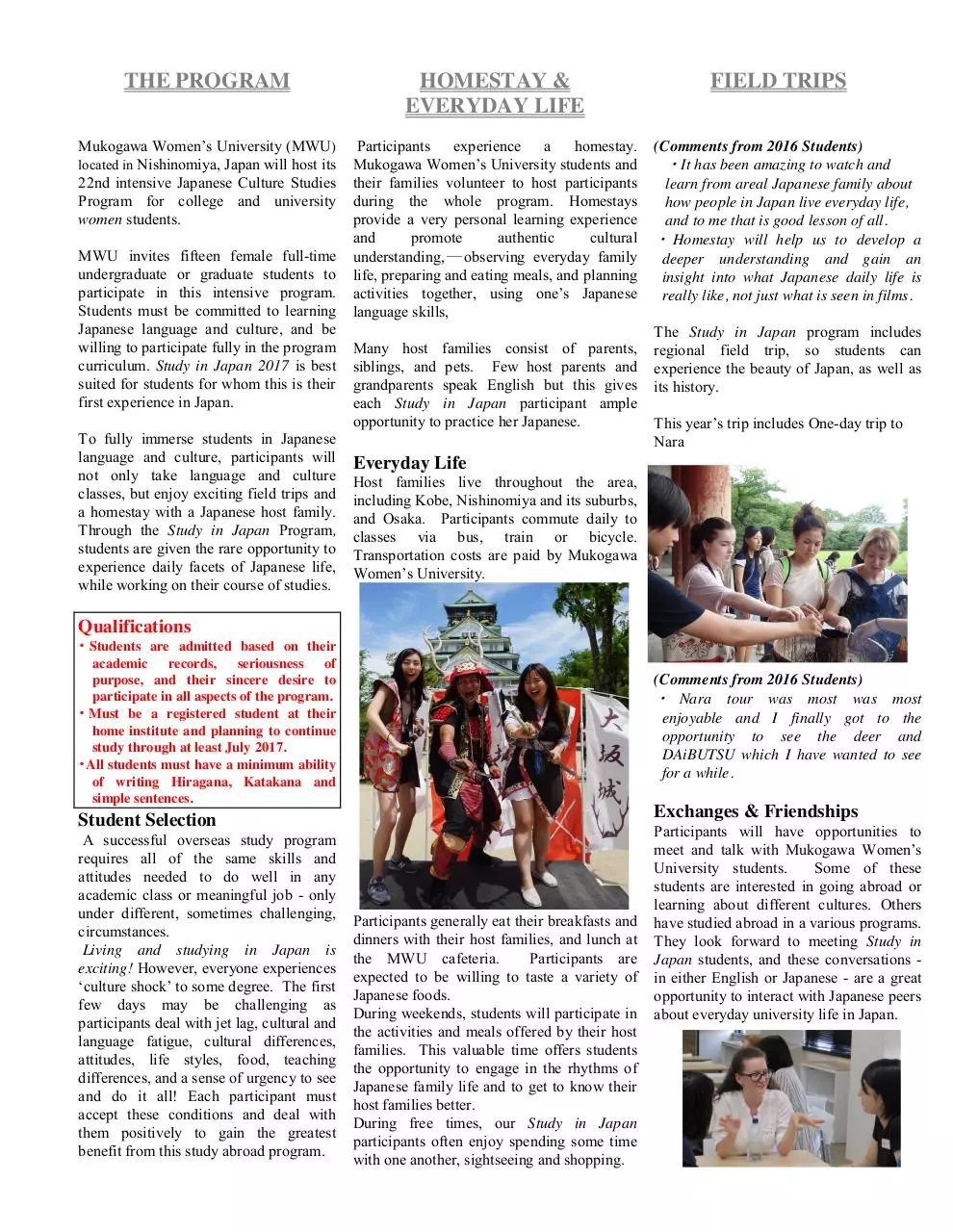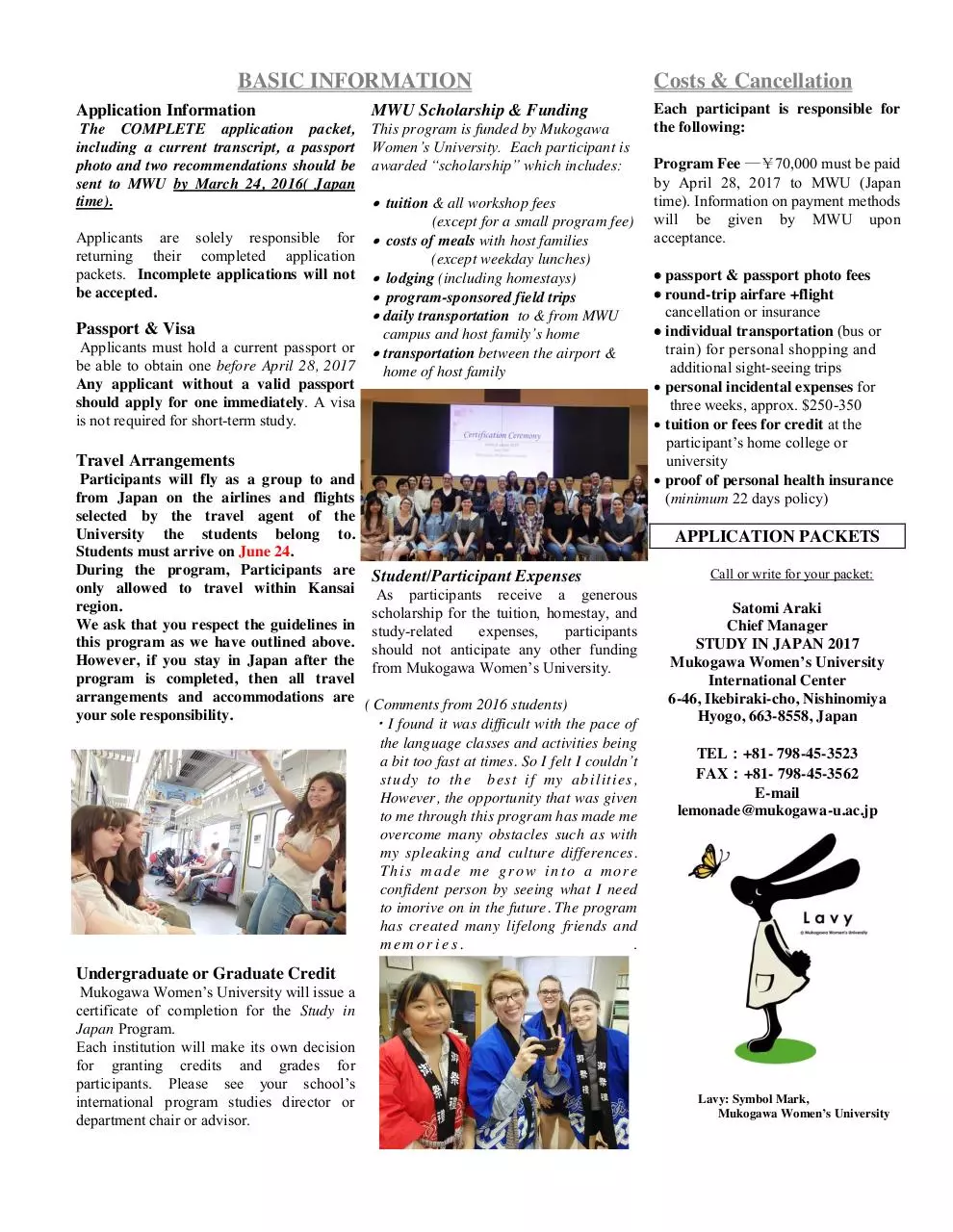2017USA (PDF)
File information
Title: Study in Japan
Author: kok004
This PDF 1.3 document has been generated by Microsoft® Word 2010 / Mac OS X 10.11.6 Quartz PDFContext, and has been sent on pdf-archive.com on 29/01/2017 at 20:51, from IP address 150.131.x.x.
The current document download page has been viewed 704 times.
File size: 888.77 KB (4 pages).
Privacy: public file




File preview
27 Jan, 2017 revised
Study in Japan 2017
June 24- July 15
Mukogawa Women’s University
Nishinomiya, Japan
Small, intensive language class
Lectures on contemporary and traditional culture
Educational field trips
Homestays with Japanese host families
Scholarships available!
THE PROGRAM
HOMESTAY &
EVERYDAY LIFE
Mukogawa Women’s University (MWU)
located in Nishinomiya, Japan will host its
22nd intensive Japanese Culture Studies
Program for college and university
women students.
Participants
experience
a
homestay.
Mukogawa Women’s University students and
their families volunteer to host participants
during the whole program. Homestays
provide a very personal learning experience
and
promote
authentic
cultural
understanding, ― observing everyday family
life, preparing and eating meals, and planning
activities together, using one’s Japanese
language skills,
MWU invites fifteen female full-time
undergraduate or graduate students to
participate in this intensive program.
Students must be committed to learning
Japanese language and culture, and be
willing to participate fully in the program
curriculum. Study in Japan 2017 is best
suited for students for whom this is their
first experience in Japan.
To fully immerse students in Japanese
language and culture, participants will
not only take language and culture
classes, but enjoy exciting field trips and
a homestay with a Japanese host family.
Through the Study in Japan Program,
students are given the rare opportunity to
experience daily facets of Japanese life,
while working on their course of studies.
Many host families consist of parents,
siblings, and pets. Few host parents and
grandparents speak English but this gives
each Study in Japan participant ample
opportunity to practice her Japanese.
FIELD TRIPS
(Comments from 2016 Students)
・It has been amazing to watch and
learn from areal Japanese family about
how people in Japan live everyday life,
and to me that is good lesson of all.
・ Homestay will help us to develop a
deeper understanding and gain an
insight into what Japanese daily life is
really like, not just what is seen in films.
The Study in Japan program includes
regional field trip, so students can
experience the beauty of Japan, as well as
its history.
This year’s trip includes One-day trip to
Nara
Everyday Life
Host families live throughout the area,
including Kobe, Nishinomiya and its suburbs,
and Osaka. Participants commute daily to
classes via bus, train or bicycle.
Transportation costs are paid by Mukogawa
Women’s University.
Qualifications
・ Students are admitted based on their
academic records, seriousness of
purpose, and their sincere desire to
participate in all aspects of the program.
・ Must be a registered student at their
home institute and planning to continue
study through at least July 2017.
・All students must have a minimum ability
of writing Hiragana, Katakana and
simple sentences.
(Comments from 2016 Students)
・ Nara tour was most was most
enjoyable and I finally got to the
opportunity to see the deer and
DAiBUTSU which I have wanted to see
for a while.
Exchanges & Friendships
Student Selection
A successful overseas study program
requires all of the same skills and
attitudes needed to do well in any
academic class or meaningful job - only
under different, sometimes challenging,
circumstances.
Living and studying in Japan is
exciting! However, everyone experiences
‘culture shock’ to some degree. The first
few days may be challenging as
participants deal with jet lag, cultural and
language fatigue, cultural differences,
attitudes, life styles, food, teaching
differences, and a sense of urgency to see
and do it all! Each participant must
accept these conditions and deal with
them positively to gain the greatest
benefit from this study abroad program.
Participants generally eat their breakfasts and
dinners with their host families, and lunch at
the MWU cafeteria.
Participants are
expected to be willing to taste a variety of
Japanese foods.
During weekends, students will participate in
the activities and meals offered by their host
families. This valuable time offers students
the opportunity to engage in the rhythms of
Japanese family life and to get to know their
host families better.
During free times, our Study in Japan
participants often enjoy spending some time
with one another, sightseeing and shopping.
Participants will have opportunities to
meet and talk with Mukogawa Women’s
University students.
Some of these
students are interested in going abroad or
learning about different cultures. Others
have studied abroad in a various programs.
They look forward to meeting Study in
Japan students, and these conversations in either English or Japanese - are a great
opportunity to interact with Japanese peers
about everyday university life in Japan.
THE CURRICULUM: JAPANESE LANGUAGE AND CULTURE
LANGUAGE COURSES
Students will take a full course load - two
classes. Below is an explanation of the
courses and the number of classroom hours.
I. Japanese Language
The goal of the language courses will be to
improve each participant’s listening,
speaking, reading, and writing skills in
Japanese. While participants need to be
realistic that they will not become fluent
within their short stay, their fluency can
improve substantially in these intensive
daily classes.
Students will be divided into one of two
levels, depending upon their individual level
of proficiency. The language classes will
be appropriate for students who have
completed first and second year Japanese
language training.
Level I
Students will focus on day-to-day
conversation and reading. The readings will
include articles about Japanese customs and
related cultural aspects of the language. By
the end of the course, the students will be
able to:
*express basic greetings in Japanese
*ask and answer simple questions about
their own hometown and family, and talk
about their experiences while in Japan
*read and write words and phrases in
hiragana and katakana as well as a number
of kanji
Level II
Students will practice reading and writing as
well as audit a course on Japanese language.
By the end of the course, the students will be
able to:
*read short articles in Japanese about
language customs and related cultural
nuances
*w rite short articles using Japanese
about their impressions of Japan
*converse using daily expressions
*use more than 200 kanji
*apply essential grammar when writing
and speaking
CULTURE COURSES
Two intensive culture courses will be
taught, one focusing on Japan’s
traditions, the other on modern Japan.
These multi-faceted courses will
comprise of lectures, workshops,
discussions, and field trips. Their
purpose is to give students a broad but
intensive look at the development of
Japanese culture.
(Comments from 2016 Students)
・ I enjoyed the range of activities
have done inside and outside the
Japanese lessons and it has been a
wonderful
and
challenging
experiences that has been thrilling
every second.
II. Traditional Japanese Culture
& Art
Students have the opportunity to
attend lectures and participate in
wo r k s h o p s o n s u c h t r a d i t i o n a l
Japanese arts as:
(Comments from 2016 Students)
・Shodo was enjoyable because I like
traditional things, and it gave me a
chance to try ancient tradition and
learn a bit about the history of Kanji
and Horagana
III. Contemporary Japanese Society
This course will explore the complex
facets of a strong, traditional culture in
the modern world. Topics include:
*Japanese Society
*Cross-Cultural Communication
Students will examine a wide range of
topics, including family relationships
and the structure of Japanese society.
*Shodo (calligraphy)
*Japanese Dance
*Mochi Pounding
Students will also visit Nara, Todaiji
Temple, one of the UNESCO’s World
Heritages, a breath-taking example of
ancient Japanese architecture and art.
Attendance at all classes, lectures,
workshops, field trips, exchanges and
program activities is required. All
language classes
Japanese.
are
conducted
in
Professors
More than a dozen MWU professors
will participate in teaching this
program.
Academic Hours
Japanese Language
36.0 hours
Japanese Culture
18.0 hours
Japanese Society
9.0 hours
Include Exchanging with MWU
students
Orientations
5.5 hours
Total Classroom Hours: 68.5 hours
BASIC INFORMATION
Application Information
MWU Scholarship & Funding
The COMPLETE application packet,
including a current transcript, a passport
photo and two recommendations should be
sent to MWU by March 24, 2016( Japan
time).
This program is funded by Mukogawa
Women’s University. Each participant is
awarded “scholarship” which includes:
Applicants are solely responsible for
returning their completed application
packets. Incomplete applications will not
be accepted.
Passport & Visa
Applicants must hold a current passport or
be able to obtain one before April 28, 2017
Any applicant without a valid passport
should apply for one immediately. A visa
is not required for short-term study.
tuition & all workshop fees
(except for a small program fee)
costs of meals with host families
(except weekday lunches)
lodging (including homestays)
program-sponsored field trips
daily transportation to & from MWU
campus and host family’s home
transportation between the airport &
home of host family
Travel Arrangements
Participants will fly as a group to and
from Japan on the airlines and flights
selected by the travel agent of the
University the students belong to.
Students must arrive on June 24.
During the program, Participants are Student/Participant Expenses
only allowed to travel within Kansai As participants receive a generous
region.
scholarship for the tuition, homestay, and
We ask that you respect the guidelines in study-related
expenses,
participants
this program as we have outlined above. should not anticipate any other funding
However, if you stay in Japan after the from Mukogawa Women’s University.
program is completed, then all travel
arrangements and accommodations are
( Comments from 2016 students)
your sole responsibility.
・I found it was difficult with the pace of
the language classes and activities being
a bit too fast at times. So I felt I couldn’t
study to the best if my ab ilities,
However, the opportunity that was given
to me through this program has made me
overcome many obstacles such as with
my spleaking and culture differences.
T h i s m a d e m e g r o w i n t o a mo re
confident person by seeing what I need
to imorive on in the future. The program
has created many lifelong friends and
memories.
.
Costs & Cancellation
Each participant is responsible for
the following:
Program Fee ―¥70,000 must be paid
by April 28, 2017 to MWU (Japan
time). Information on payment methods
will be given by MWU upon
acceptance.
passport & passport photo fees
round-trip airfare +flight
cancellation or insurance
individual transportation (bus or
train) for personal shopping and
additional sight-seeing trips
personal incidental expenses for
three weeks, approx. $250-350
tuition or fees for credit at the
participant’s home college or
university
proof of personal health insurance
(minimum 22 days policy)
APPLICATION PACKETS
Call or write for your packet:
Satomi Araki
Chief Manager
STUDY IN JAPAN 2017
Mukogawa Women’s University
International Center
6-46, Ikebiraki-cho, Nishinomiya
Hyogo, 663-8558, Japan
TEL:+81- 798-45-3523
FAX:+81- 798-45-3562
lemonade@mukogawa-u.ac.jp
Undergraduate or Graduate Credit
Mukogawa Women’s University will issue a
certificate of completion for the Study in
Japan Program.
Each institution will make its own decision
for granting credits and grades for
participants. Please see your school’s
international program studies director or
department chair or advisor.
Lavy: Symbol Mark,
Mukogawa Women’s University
Download 2017USA
2017USA.pdf (PDF, 888.77 KB)
Download PDF
Share this file on social networks
Link to this page
Permanent link
Use the permanent link to the download page to share your document on Facebook, Twitter, LinkedIn, or directly with a contact by e-Mail, Messenger, Whatsapp, Line..
Short link
Use the short link to share your document on Twitter or by text message (SMS)
HTML Code
Copy the following HTML code to share your document on a Website or Blog
QR Code to this page

This file has been shared publicly by a user of PDF Archive.
Document ID: 0000545506.